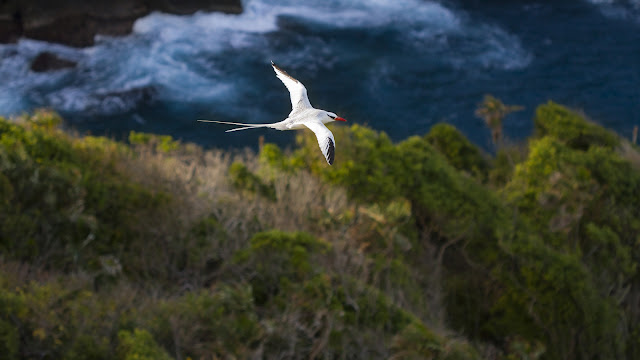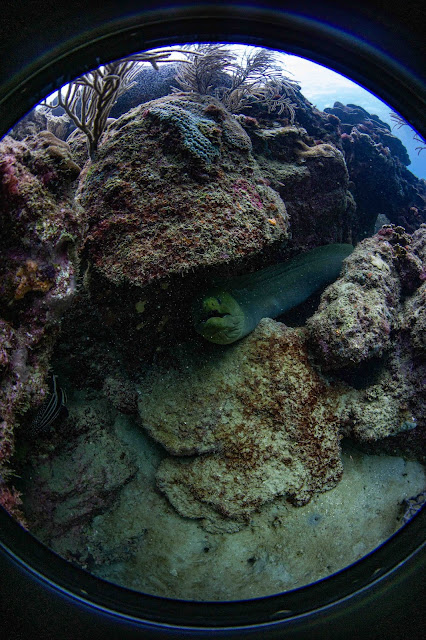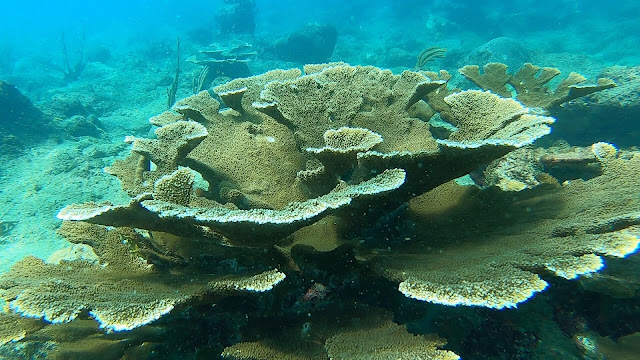Connecting to Climate Change
Why should we pay attention to coral
reefs, which are only half alive? What does climate change have to do with
Tobago? What does it all mean? Pat Ganase provides a perspective.
Around the
world, we are witnessing catastrophic changes that we are told have been
brought about by man’s industrial progress. It turns out that over the last
century, our activities are heating up the planet. Ice caps are melting.
Terrific storms are brewing over warming waters. The coral reefs are dying. The
mean temperature of the planet’s surface has heated up by one degree Centigrade
since the industrial age, just over 100 years ago; and is edging up by
fractions of a degree every decade.
How could Tobago
be expected to take responsibility for what seven billion of us together are
shaping? Perhaps it will all pass us; and Tobago will be spared.
 |
| Mt Irvine Reef: though vibrant, fish life here is heavily impacted by pollution and sedimentation (Photo courtesy Anjani Ganase) |
CORAL REEFS
No, it’s not
that simple. We are small examples of the whole. Global warming – occurring as
the result of humankind’s activities - is decimating coral reefs everywhere.
After witnessing the decline and bleaching of parts of the Great Barrier Reef
that runs the length of Australia’s east coast, the GBR Foundation recently
launched the largest environmental campaign to generate interest. The five
areas to be tackled are examples that could be applied to coral reefs
everywhere:
Water quality;
Crown of Thorns
Starfish control (species management);
Reef restoration
and adaptation;
Indigenous and
Community Reef protection; and
Reef monitoring
and reporting.
Coral reefs are
natural resources – rich and diverse as rainforests – that provide nurseries
for marine species and protection for coasts. Isn’t it time for us to pay the
same attention that Australia is dedicating to their reefs to ours. The Buccoo
Reef Marine Preservation Area (MPA) was designated since 1973; but management
and monitoring practices probably need to be updated and more diligently
exercised. What about the other reefs around Tobago? Local communities know
where these are; and there is a petition to create an MPA around the north of
the island from Castara to Roxborough. Surely these environmental concerns will
be heard and legitimized by a government with climate change adaptation and
mitigation on their agenda?
 |
|
Speyside Reef: this pale Orbicella coral on the reef near
Little Tobago is showing signs of stress. (Photo courtesy Anjani Ganase)
|
CLIMATE CHANGE
The slow awakening
to the need to safeguard marine resources including coral reefs is especially
incomprehensible when one considers that West Indian scientists are in the
forefront of the work that is being done at the level of the Inter-governmental
Panel on Climate Change (IPCC). The recent report - compiled and checked by hundreds of
scientists around the world – has vindicated the models projected by the UWI
team on the IPCC.
“Caribbean scientists
have long held the position that (global temperature rise of) 1.5 degrees may
be the limit of global warming that vulnerable regions such as ours can
tolerate.” Michael Taylor, professor and Dean of the Faculty of Science and
Technology at the University of the West Indies (Mona) commented on the IPCC 1.5
Report released on October 8. Professor Taylor is one
of the coordinating lead authors of the report.
Among other UWI scientists who served as contributing
authors to the IPCC reports on climate change are Professors Anthony Chen, Leonard Nurse and John Agard who were
members of the IPCC which received the Nobel Peace Prize in 2007.
Should we not
pay attention to our own experts?
Leonard Nurse, professor of Integrated
Coastal Management and Climate Change Adaptation at the Centre for Resource
Management and Environmental Studies (CERMES) at the Cave Hill campus,
said, “The conclusions are clear – while
the application of various mitigation and adaptation technologies will be
helpful, there is absolutely no substitute for deep (carbon) emission cuts at
source, particularly in high emitting countries. The report also corroborates
previous IPCC findings that small island and low-lying states such as ours in
the Caribbean are among the countries at highest risk.”
Do we need to be reminded that, per
capita, Trinidad and Tobago is one of the highest carbon emitters in the world?
Surely Tobago’s rainforest and natural marine areas are mitigating influences
in the total output of the nation. Is this enough? Think of those states in the
Pacific that have already lost islands: what did they do to deserve this? The
lesson is that we are all in this together. One earth. One ocean.
A FOSSIL FREE WORLD
Professor Taylor warns us, “ Even 1.5
degrees poses significant risks to the most vulnerable. Global action on
climate change is not optional but is a must. I am hoping we can
spur a region-wide movement in response to this report, its findings and the
significance for the region. Every
half-degree of warming counts. The global target of 1.5 degrees comes with
significant risk. These risks pale compared to 2 degrees, which has long been
viewed as the realistic target.
“To keep warming at 1.5 degrees requires
significant global transformation in energy and transport. In the Caribbean, we
must undertake those measures geared at adaptation and mitigation. We must also
by example, or influence, persuasion or advocacy, model the social order that
living within 1.5 degrees demands.”
What is this social order demanded by 1.5
degrees? One of the most important messages for the individual is perhaps the
simplest: reduce (consumption), re-use (everything), recycle. This message is
not only about plastic waste. It is a philosophy that goes against the culture
of “more and bigger”; that speaks of old-fashioned values: enough is enough;
waste not want not. It is asking us, at the personal and community level, to
live lightly. Go beyond refusing the plastic straw to using only what we
absolutely have to.
Look to the rest of the world: campaigns
have moved from “no straw” to “no plastics,” and are already taking the big
step to “a 1.5 world is a fossil free world.” Isn’t it time for Tobago to differentiate
itself and make use of its abundant solar energy?
ONE ECOSYSTEM: FROM RAINFOREST TO DEEP
REEF
One of the strategies for adaptation and
mitigation is the call to conserve biodiversity by protecting natural habitats,
which are crucial buffers to climate change. A prime example in Tobago would be
to recognize the inter-related land and sea system that protects the southwest
coast. The link between the marshes and mangrove of the Bon Accord lagoon and
the Buccoo Reef has long been identified, and forms one of the significant
proposals in the National Protected Area Systems Plan 2018. Indeed, all Tobago
is a comprehensive island ecosystem that embraces diverse species of flora and
fauna, including migrant sea birds, pelagic fish like wahoo and mahi mahi,
turtles, sharks and whales, on land and on the reefs, in a virtuous circle of
life; surely she is worthy to be protected.
Here, we already enjoy many of the prescriptions
against climate change: pristine and protected habitats, the rich and thriving
biodiversity that provides opportunities for adaptations; non-harming village
lifestyles. Are we ready to consciously care for our island as if she were the
whole earth?
 | ||
| Tobago or not Tobago: "Beyond Ordinary... Unspoilt, Untouched, Undiscovered" or "constructed, developed, habitats destroyed" |



